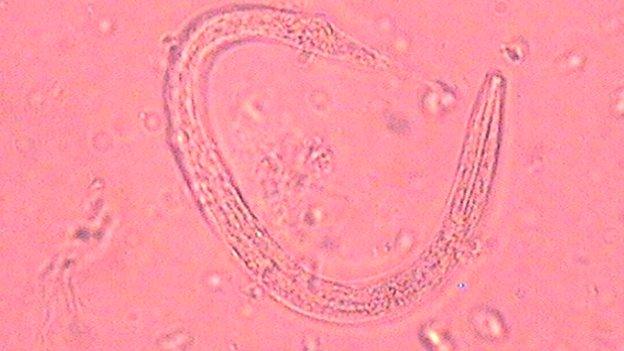Kidney deaths: Prof rejected infected transplant organs
- Published
The transplant was the first for Robert Stuart and the third for Darren Hughes
A Cambridge professor rejected donor kidneys that were later found to be infected with a parasitic worm that killed two transplant patients, an inquest has heard.
Robert "Jim" Stuart and Darren Hughes were given kidneys infected with the meningitis-causing worms in transplants carried out in Cardiff in 2013.
Prof Christopher Watson said no-one could have foreseen the outcome.
But he told Cardiff Coroner's Court he would not have used the kidneys.
Speaking about the cases, Prof Watson from the University of Cambridge's department of surgery told the inquest that he had been asked if the donor kidneys should be accepted for transplant at his hospital.
"I declined it on the night when contacted by my colleague," he said.
But the expert added that the parasitic infection was incredibly rare.
"I doubt we'll ever see this again. No-one could have foreseen that," he said.
Both men died of meningitis two weeks after receiving the transplants, the same infection that had killed the kidney donor.
The cause was only established once post-mortem examinations were carried out on Mr Hughes' and Mr Stuart's bodies.
'Best intentions'
Prof Watson, who was part of a three-person panel asked to review this case, said it was a "concern" that the donor had been in hospital for nine days with no sign of improvement before he died despite receiving treatment.
He added: "I'm quite sure Mr Asderakis did these transplants with the best intentions for the two patients to have a successful outcome with no intention to cause any sort of harm.
"I can understand how he came to his risk/benefit equation. That's not the one I would have come to."
It emerged during evidence to the inquest on Wednesday that Prof Watson's own hospital had been offered the kidneys for transplantation.
But he advised colleagues
Prof Watson said he was "extremely impressed with the care when the diagnosis was made" and the efforts made across the UK and in the US to find out the cause of the infection.

Halicephalobus parasite

The donated kidneys were infected with a parasitic worm
The parasitic worm halicephalobus lives in soil, manure and compost
It infects animals and humans, but this is still incredibly rare
There have been only a handful of cases in humans since the infection was first described in 1954 by a researcher called Stefanski
It is unclear how the worm gets into the body - it could be by ingestion of its eggs or it entering through a break in the skin
Once inside, it can multiply and invade tissues such as the brain and kidneys
Doctors diagnose it by looking at tissue samples, but since it is so rare it is not something that will be top of their check list
The problem may only become apparent after a post-mortem examination

Earlier, the court heard that both patients had been told the donor had had meningitis when he died, despite claims earlier in the hearing that relatives had made stating the opposite.
Usman Khalid, a clinical research fellow from Cardiff's University Hospital of Wales who was part of the transplant team, said both men had the opportunity to refuse the operations.
Mr Stuart's widow Judith challenged Mr Khalid's evidence from the courtroom floor, asking him to "tell the truth".
"I have," was the reply.
Mr Khalid also caused unrest in the public gallery after saying Mr Hughes signed his own consent form prior to surgery.
This contradicts what Mr Hughes's father Ian said previously when he claimed to have signed the form on his son's behalf to a neurological condition which left him unable to hold a pen.
The inquest also heard no case of infection by the worm had ever been successfully diagnosed and treated.
The inquest has been adjourned for the day.
- Published19 November 2014

- Published18 November 2014

- Published17 November 2014

- Published14 November 2014

- Published14 November 2014

- Published24 November 2014
